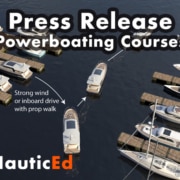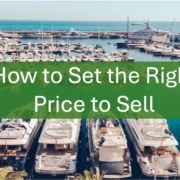Your Comprehensive Guide to Buying a Powerboat
Essential Tips for a Smooth & Enjoyable Purchase Experience
This article and advice was graciously provided by Brewer Yacht Sales, one of the leading powerboat brokers on the US East Coast.
Brewer Yacht Sales has served boaters from Maine to Florida for over twenty-five years, and their yacht sales professionals possess an unparalleled level of knowledge about the brokerage industry and powerboat sales. Their advice to NauticEd students is greatly appreciated!
No matter your boat ownership history, purchasing a new (or new to you) powerboat is an exciting milestone. It is also a significant investment that deserves thoughtful research, planning, and a clear understanding of the process.
Before diving into listings, talking with a yacht broker or other boating expert may help you determine what type of boat suits your needs. With their knowledge of different brands, layouts, and performance characteristics, brokers and experts offer valuable insights and save you time narrowing down the best choices.
The next steps in purchasing a powerboat are below; read on to confidently navigate your buying experience.
1. Define How You’ll Use the Boat
Before shopping, it’s essential to understand how you will use your boat. Consider these key points:
Cruising vs. Fishing vs. Watersports: What kind of boater are you? Are you after leisurely sunset cruises, offshore fishing trips, or action-packed days enjoying watersports? Many activities are suited for specific categories of boats.
Day Trips vs. Extended Cruising: Will you need overnight accommodations, and long-range capabilities, or is a day boat more appropriate?
How many people will typically be onboard? Consider seating, sleeping arrangements, and amenities for guests or family.
Enjoyment on the water comes in all different types and sizes. Carefully consider your lifestyle when shopping for your powerboat to ensure it meets your needs.
2. Determine Your Budget-Include More Than Just the Purchase Price!
It is essential to establish a budget early on in the process. In addition to the price of the boat itself, think about:
✔ Insurance premiums
✔ Dockage/slip fees
✔ Fuel costs
✔ Routine maintenance costs
✔ Winter storage (if applicable)
✔ Upgrades or refits you may want to make post-purchase
Understanding the ongoing costs will help you make a sustainable and enjoyable investment.
3. Start Shopping!
The search begins once you know what type of powerboat you’re looking for. There are several ways to find available boats:
Online Listings: Many buyers start by browsing online marketplaces, which provide a general sense of the available boats.
Boat Shows: If you are in the market for a new boat, attending shows allows you to compare multiple models in person and talk directly with manufacturers and dealers.
Yacht Brokers & Dealer Networks: Many boats are listed and sold through professional yacht brokers and dealers who can help you identify boats that fit your criteria and provide additional guidance.
When comparing different makes and models, focus on layout, construction quality, and overall condition.
4. Arrange Viewings and Sea Trials
Once you find a powerboat that checks all the boxes, it is time to schedule a showing. Especially for brokerage listings, walk through the vessel carefully and pay attention to:
Overall condition: In addition to assessing general wear and tear, look for obvious signs of water intrusion or corrosion.
Maintenance History: Are there service records that indicate a well-cared-for vessel?
Layout and comfort: Is the design practical for your needs?
5. Make an Offer
Once you’ve found “The One,” the next step is to make a formal offer. A purchase agreement should outline the following:
✔ The agreed-upon price
✔ Any contingencies (such as financing or satisfactory survey results)
✔ The deposit amount
✔ A timeline for closing
Be sure to verify documentation, including:
- Title and registration
- Lien status
- Maintenance records
Clear documentation is key to ensuring no surprises during or after the sale.
The purchase agreement is an essential step before the marine survey and sea trial. Establishing this agreement allows for a clear understanding of the terms before proceeding to the survey. After the purchase agreement is in place, the marine survey can be conducted, followed by the crucial sea trial.
6. Conduct a Marine Survey & Sea Trial
The sea trial is crucial. It demonstrates how the boat performs under power and in various conditions. Watch for handling, acceleration, noise levels, and vibrations. Once you’re serious about a boat, hiring a professional marine surveyor is highly recommended. The surveyor will inspect the boat’s structural integrity, mechanical systems, and overall condition. A thorough survey can reveal issues not visible during a simple walkthrough or sea trial.
In most cases, insurance companies and lenders require a current survey before they’ll finalize coverage or financing.
7. Closing the Sale
If both parties have agreed to the terms and the survey results are satisfactory, the closing process begins. This typically includes:
✔ Transfer of ownership documents
✔ Final payment and escrow
✔ Bill of sale
✔ Transfer of warranties (if applicable)
Ensure all registration and titling requirements are completed according to state or country laws.
8. Plan for Delivery and Ownership Transition
After closing, it’s time to get familiar with your new powerboat. Consider:
Onboarding and system orientations
Scheduling routine maintenance
Arranging for transport or delivery if necessary
Some new boaters also opt for on-the-water instruction to handle their vessel comfortably in various conditions or areas.
How a Yacht Broker Can Simplify the Process
While some buyers prefer to handle every step themselves, many choose to work with a yacht broker to make the process smoother and more efficient. A professional yacht broker acts as your advisor, helping you navigate the complexities of searching, evaluating, negotiating, and closing on a boat. Their experience, knowledge, and understanding of the market can simplify decision-making and streamline the purchase logistics.
A broker can be a valuable resource if you’re short on time, unfamiliar with the buying process, or want expert guidance.
Final Thoughts: Take Your Time and Do It Right
Buying a powerboat is an exciting experience. Whether purchasing a family cruiser or a serious offshore machine, following a thoughtful process will ensure you find the right vessel for your needs and enjoy it for many years.
When you’re ready to start shopping, take a strategic approach, gather expert advice when needed, and most importantly—remember to enjoy yourself!
Looking for instruction in the process check out Brewer Yachts Sales here – https://breweryacht.com/







